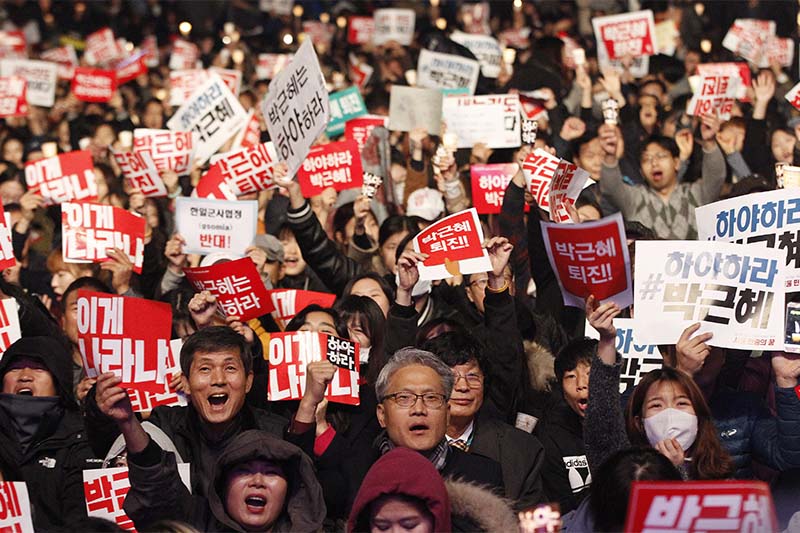Scandal unites rival Koreas in fury at South Korea's leader
SEOUL, SOUTH KOREA: In only a few days, South Korea's biggest scandal in years has done what six decades of diplomacy and bloodshed couldn't. It has united the rival Koreas, at least in one area: indignation against South Korea's leader.
North Korea's propaganda mavens have never been shy in calling South Korean President Park Geun-hye an incompetent, power-hungry clone of her late dictator father, Park Chung-hee — and that's when they're pulling their punches.
Inconceivable a week ago, many South Koreans now seem to be reaching Pyongyang levels of fury over an investigation into whether Park allowed a longtime confidante with no official government role to manipulate her administration from the shadows.
The North's fondness for vicious threats is generally missing in the South, but the anger over the scandal — sometimes partisan, mostly spontaneous on the part of many South Koreans, but more violent and somewhat canned in the North, where carefully cultivated outrage is a state commodity — often seems to be in lockstep.
For instance, in wording that North Korea would be right at home with, Ahn Cheol-soo, a lawmaker from a small South Korean opposition party and a potential presidential candidate, recently said of Park: "You no longer have the authority to destroy the constitution. You no longer have the authority to stomp on the pride of our people."
Here's how a similar sentiment looked when North Korea's main newspaper recently attacked Park: "It's deplorable that the South's politics have become the joke of the world and its economy and people's livelihoods are left in shreds."
To be clear, the expressions in South Korea, even at their sharpest, are still a long way from the odious linguistic swamp of violence and sexism that characterizes much of North Korea's propaganda. The North, for instance, has called Park a "dirty prostitute who licks her master's groin," an "aging witch," a "female dog" and an "American parrot." Pyongyang has also repeatedly called for her death.
But there has been an uptick in both rage and sexism in the South, especially online, where Park and her confidante, Choi Soon-sil, have been called "crazy bitch," ''chicken head," a slur meant to attack their intelligence, and "stupid Gangnam ajumma," a term often used to insult middle-aged women living in affluent southern Seoul. People have also declared that South Korea will never again vote for a female president or trust a woman's leadership.
It is not just happening in obscure corners of South Korea's social media or the web, never the cream of public discourse.
"Park Geun-hye threw away her authority as (the person) ultimately responsible (for governing the state) to a common street woman of unknown roots," Jae-myung Lee, the opposition mayor of Seongnam, told more than 10,000 people taking part in a recent anti-Park rally, referring to Choi. "Park has lost her authority as president and has shown that she doesn't have the basic qualities to govern a country."
That Park, who has 15 months to go in her single five-year term, should go has long been a mainstay of North Korean rhetoric. But similar sentiments are also emerging in South Korean media.
"If we had to pick one person who made the country into the shattered mess that it is now, it's none other than President Park," the South's Kyunghyang Shinmun newspaper said in an editorial on Saturday, calling for Park's resignation. "The citizens no longer want Park to govern state affairs ... She lost the political leadership to persuade and guide the ruling and opposition parties, the parliament and the people. Her moral authority as the head of state has fallen to the ground ... Continuing this state for another year and three months will make everyone miserable."
North Korea's state media have at times seemed overwhelmed with the amount of negative stories, both international and South Korean, about Park, and have often just rounded up the coverage, with some insulting comment added.
Six days after Park first acknowledged that she had sent Choi, the daughter of a shadowy religious figure who emerged as Park's mentor in the 1970s, drafts of her speeches for editing, North Korea's main newspaper, Rodong Sinmun, released a lengthy, painstaking summary of the saga, replete with sexist, violent insults.
The newspaper described Park and Choi as "two women who have lost their minds." It also broke down reports that Choi influenced important government decisions, including Park's move to shut down the last major symbol of inter-Korean cooperation, a jointly run factory park in the North Korean city of Kaesong.
"This shows to the world that Park Geun-hye is not merely a first-class dog controlled by a large monster that is the United States, but also doubly and triply a puppet manipulated by strings pulled by one 'Gangnam' woman," the North Korean newspaper said, referring to the Seoul neighborhood where Choi reportedly built a fortune on real estate investments.
Observers of North Korean propaganda have wondered about the length of time it took the newspaper, the mouthpiece of the ruling Workers' Party, to weigh in on the scandal — nearly a week. It's almost as if the paper's propaganda experts, after firing at much smaller targets for so long, couldn't quite believe the huge gift they'd been given.
Pyongyang has more recently stepped things up.
For instance, the North's official Korean Central News Agency published a statement by a Foreign Ministry unit said that Park's actions had caused a "hideous power-backed scandal unprecedented in history." It predicted that a "mass struggle" of enraged South Koreans will leave Park at a crossroads where she is forced to choose between quitting her presidency on her own or facing impeachment.
With tens of thousands of South Korean protesters calling for Park's ouster over the weekend and bigger crowds expected in coming days, Pyongyang's breathless, over-the-top propaganda might not be so far off the mark.






